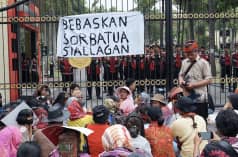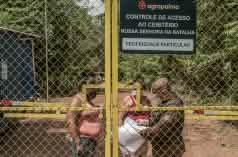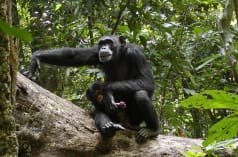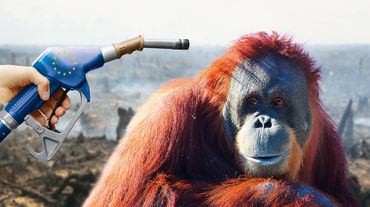Leaders from the Global South protest against WWF International in Geneva
Dec 4, 2009
In front of the international head quarters of WWF (World Wildlife Fund) in Gland Geneva, participants of the Social and Climate Justice Caravan made their first protest action. Delegates from farming organisations, indigenous and fisher folk from the South denounced the greenwashing carried out by WWF in their respective countries.
First action of the Social and Climate Justice Caravan
In front of the international head quarters of WWF (World Wildlife Fund) in Gland Geneva, participants of the Social and Climate Justice Caravan made their first protest action. Delegates from farming organisations, indigenous and fisher folk from the South denounced the greenwashing carried out by WWF in their respective countries. The participants of the caravan unfurled banners and protested in front of the surprised directors of the WWF. With a megaphone they began a large litany of the many cases where the WWF have ignored the wishes and the needs of the local people with their objective to “conserve” the natural world.
In the last years the WWF have initiated various round table discussions about sustainable production with the most controversial commodities at the environmental and social level, like soya, African palm oil, sugar, cotonl , aguaculture and agrofuels. These spaces of multi sectoriall dialogues are rejected from the social movements, because they confuse and divert the attention from the severity of the reality. In many places these models of production are the causes of human rights violations.
The WWF were accused of covering up the environmental and social impacts of the multinationals supposed “conservation” projects. Javiera Rulli of Argentina, denounced the round table for Responsible Soya (RTRS) led by the WWF for being a platform for industry and the biggest polluters. Rulli denounced the rticipation of the worst and most criminal agrobusiness corporations, such as Monsanto, Syngenta, Cargill, ADM and Bunge. She also reprimanded the WWF for promoting carbon credits for the cultivation of soya. Jorge Galeano, a farmer leader for agrarian and popular movements in Paraguay, objected to the certification of GM (Genetically Modified) soya as sustainable cultivation. He also expressed his rejection of the acceptance of the sustainable criteria in the soya fields where they spray agrotoxics at a distance of 20m from urban dwellings. The fumigation actions sicken people, especially impacted in their health are children and women. Galeno concluded that soya is responsible for death and destruction. The round table of “responsible soya” is a lie. Elisangela Araujo, general coordinator for the FETRAF (Federation of familiar agriculture of Brazil) denounced the corporate concentration which implicates soya in Brazil. According to her it is impossible that that soya in large scale is sustainable. FETRAF participated in the first conference of the RTRS but abandoned the initiative on account of there not being protection for the interests of the typical agricultural farmer. Roland Vibal, of SeaFish for Justice, an association of Asian fisherfolk, informed people about the oncoming mega project of privatization of the coral reefs “The Triangular Coral Initiative”. This project will signify the expulsion and disappearance of sustenance for many thousands of fishing families and it was imposed on the region without the consent and participation of the local population.
According to Vibal it is intolerable that with the objective of alleviating Climate change by the expulsion of people of the south and their territories. They, the fisherfolk are victims of climate change and not the cause! The leader Jose Goyes from the political Commission for regional indigenous Council of Cauca and la Minga social and community referred to the round table of sustainable palm oil (RSPO). The RSPO in Colombia is certificating monocultures implemented by paramilitaries. The communities of African descended farmers and indigenous are expelled by paramilitary groups with violence to appropriate their lands. How is it possible to qualify this as sustainable production? He asked them. Mister Goyes also accused the WWF for its complicit silence in lieu of the fumigation of coca fields in Colombia which has caused damage to the heart of life for communities and irreparable damage to the native forests. Finally, a speaker for the Swiss coalition for social and climate Justice denied the role that the had been given to the WWF by the Swiss government as the only official representative of civil society in the official delegation in Copenhagen. A representative of the WWF tried to sympathise with the delegates and gave his thanks for the “visit”. This expression was loudly reacted to by the demonstrators who returned to denouncing the role of WWF in climate change.
For more information see www.climatecaravan.org.
Source: http://www.climateimc.org/es/node/6400











